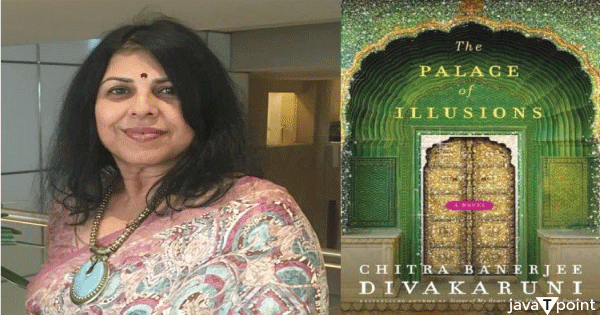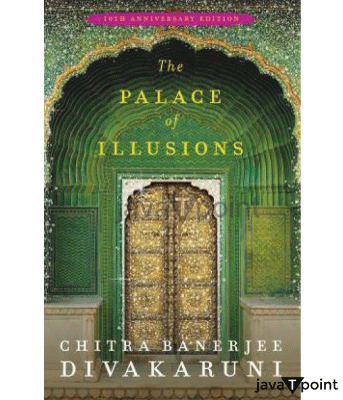The Palace of Illusions SummaryAbout AuthorChitra Divakaruni is a renowned author of 21 books, which include Mistress of Spices, Palace of Illusions, Sister of My Heart, The Forest of Enchantments, and The Last Queen, Before We Visit the Goddess. She is also an activist, lecturer, speaker, and prestigious writer. Her most recent book, Independence, tells the journey of 3 sibling sisters as India breaks free from British rule in a devastated war in Calcutta. She writes both for youngsters and adults. 
Her writing has been featured in over a hundred journals and anthologies, including The Best American Short Stories, The Atlantic, The New Yorker, and the O. Henry Prize Stories. It has additionally been translated into many other languages approx. 30 different languages, including Japanese, Dutch, Hungarian, Hebrew, Turkish, Bengali, and Hindi. Her writings have been staged as operas and adapted into movies, plays, and ballet dramas. She has won several honors, including the American Book Award, the PEN Josephine Miles Award, the Light of India Award, and the Premio Scanno as well. She was listed as one of the 20 Most Influential Global Indian Women in the year 2015 by The Economic Times as well. She teaches creative writing as a McDavid professor at the renowned University of Houston in the Creative Writing Programme, where she also resides with her spouse Murthy. As a domestic violence and education activist, Divakaruni has worked significantly together with non-profit organizations Pratham, which educates children from impoverished backgrounds in India, Akshaya Patra, which provides meals to Indian schoolchildren, and Daya and Maitri, which helps individuals who survive domestic violence to start over. The Palace of Illusions Summary
The Palace of Illusions, a 2008 book by Chitra Banerjee Divakaruni, is based on the legendary Hindu epic holy history known as "The Mahabharata". Panchaali, a princess birthed from fire, tells the story from her point of view. Dhri, her brother, was also born similarly. They live in a universe where magic and supernatural entities are prevalent. King Drupad, the father of Panchaali, raises her in the palace and seeks vengeance on his rival Drona. The wise man Vyasa said that Panchaali would grow up to be a great and strong queen who would be married to five men. Vyasa, however, also asserts that Panchaali would bring about significant harm in her kingdom. The deity Krishna serves as Panchaali's mentor and protector throughout her life. As soon as Panchaali reaches the age of marriage, King Drupad holds a competition to find her a spouse. Mighty warrior Karna first succeeds in the contest's archery test alone, but Panchaali disgraced him by inquiring about his parents. She has love feelings for him despite the fact that he is unable to provide a response to her question. Karna leaves feeling ashamed. Another among the Pandava princes, Arjun, intervenes and triumphs in the competition. Panchaali visits Arjun's relatives back home. Panchaali must wed the other 4 Pandava brothers, according to Kunti, his mother. After their cousin Duryodhan attempted to murder them with a fire, the Pandavas fled into hiding. King Bheeshma separates the empire of the Pandavas and the Kauravas, who are ruled by Duryodhan after Panchaali married the Pandava siblings. The Pandavas settle in the Palace of Illusions, a wondrous edifice that Panchaali grows to adore, and construct the thriving city of Indra Prastha. Duryodhan is humiliated when he falls into a pool while on a visit and the people around Panchaali laugh at him. The eldest Pandava, Yudhisthir, stakes the Pandavas' palace and liberties in a dice game the next time they go to Duryodhan. As a result, Panchaali and her husband are banished to the forest for a period of twelve years whereas Duryodhan gains control of the Palace of Illusions. In exile, Panchaali's only goal is retribution. The Pandavas hid out in a nearby palace after spending 12 years in exile. Panchaali, who pretends to be a maid, rejects Prince Keechak's advances and his threats to rape her. Keechak is killed by Panchaali and her spouse, Bheem. This bloodshed leads to the start of the epic battle between the Pandavas and the Kauravas. In the conflict, a lot of individuals who are close to Panchaali passed away including Dhri, Drupad, and Karna. Panchaali's husbands decide that it is the moment for them to die and enter the realm of the afterlife after learning about Krishna's demise shortly after the conflict. Karna and Panchaali are reunited in paradise. Themes
From the flames, Draupadi and her brother were birthed. She believes that her father did not adore her quite as much as she wanted since he focused more on her siblings. She believes her father is biased toward her by nature. She believed that her father paid her brother more attention simply because he was a male and would one day rule Panchal. As is customary for Chitra Banerjee's protagonists, Draupadi is dissatisfied with her father's devotion this time around. Draupadi makes a self-promise that her palace shall not resemble that of her father. The mansion her father built seems heavy on her shoulders. These words demonstrate that Draupadi dislikes her father's propensity to be partial towards her and her castle.
Then, Draupadi, a character, brings up a different aspect of the difficulties women confront in the world of men. They had to abide by laws established by men. The interests and propensities of women were never taken into account. The same thing occurs in this instance even with regard to Draupadi. She has received education in music, dance, singing, and playing. She also received teaching in other subjects, such as sketching, painting, sewing, and adorning the ground with ancient designs that were auspicious for certain holidays. However, Draupadi's heart and thoughts were focused on something else. She was more adept than her brother Dhristadyumna at figuring out puzzles, responding to clever questions, and crafting lovely poetry. Draupadi desired the educational opportunity that Dhristadyumna had received for herself. She does not view her education as being Dhristadyumna got. She sensed that the female community was around her like a noose. Learning the 64 arts that high-class ladies should master was difficult for Draupadi. Draupadi's father, King Draupad, disregarded her education. Draupadi pleaded for her and her brother Dhristadyumnaher to have an equal education. Education-related issues continue to be a major challenge in the twenty-first century.
This assertion is disagreed with by Draupadi; she had a disagreement with Dhai Ma. Dhai Ma depicts the actual life of the king and queen. She highlights the fact that kings have several wives and that males consistently breach the vows they make prior to marriage. She stated that Draupadi wouldn't even get a chance to speak to her spouse before he beds her if she were compelled to marry off like Panchal's other princess. Draupadi's statements were in stark contrast to those of Dhai Ma.
The author's main point of focus is the issue of gender disparities. Either the lady is non-existent or she is passive. The author of the novel here strongly brings up the concern that women are typically seen as passive in our society or perspective on the world. Chitra Banerjee brings up the issue of the class/ caste system in the chapter Scar. Karna was a superb fighter who, nevertheless, had to endure the contempt of all the rulers of Bharat due to his low caste. Other than rulers, Draupadi hurt him. Karna experienced anguish when Draupadi approached him and inquired about his parents, even though he chose to go away.
Next Topic#
|
 For Videos Join Our Youtube Channel: Join Now
For Videos Join Our Youtube Channel: Join Now
Feedback
- Send your Feedback to [email protected]
Help Others, Please Share









